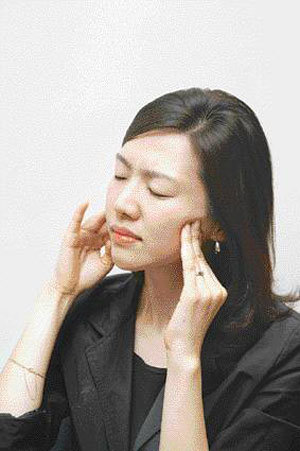Jaw Joint Problems

Jaw joint disorders are usually attributed to stress, bad habits, and excessive use of jaw joints.
One of the common causes of jaw joint disorder is teeth grinding and clenching, which a person may do when feeing anxious or stressed. When teeth clenching becomes a habit, it can lead to chronic inflammation of the muscles around the joint or the dislocation of the jaw joint. Grinding ones teeth at night when a person is sleeping can result in jaw joint problems as well.
Bad habits can also cause problems affecting the jaw joint. Those who use computers for work for a long time may develop such problems. Sitting at a desk while resting ones chin on ones hand or stretching out ones neck can increase pressure on the ligaments and muscles surrounding the jaw, leading to inflammation. The prevalence of jaw joint disorders are frequently reported among women and young adolescents.
According to a survey of 317 patients with jaw joint problems conducted by dentistry professor Kim Young-kyun at Seoul National University Bundang Hospital, the number of female patients (242) was 3.2 times larger than that of male patients (75). Among age cohorts, the number of people under 40 was 233, or 73.5 percent. The number of those who were under 25 was 120, or 37.8 percent.
Experts say that women have a higher prevalence of jaw joint disorder because they tend to respond quicker when problems arise compared with males, or they are more sensitive to the effects of chronic stress.
Such problems are said to be on the rise among young adults in their teens and twenties and deemed to be closely linked to exam- and employment-related stress. Some experts say that men or elderly people are not likely visit hospitals because they tend to be slow to respond to pain they suffer.
The most common symptoms include jaw joint clicking - this may make a sound and a patient may feel pain when opening his or her mouth. If such symptoms become worse, it may lead to pain in and around the ear, cheekbone, or neck. It may also increase muscle tension around the jaw joint, resulting in headaches.
Most jaw joint symptoms disappear after a while when avoiding abruptly opening ones mouth and reducing stress. Combining drug treatment with physical therapy can ease the symptoms.
However, if problems occur with the jaw joint disc due to the negligence of such problems, a jaw joint disc implant may be necessary. The implant involves replacing an irreparable jaw joint disc with cartilage from other parts of the body.
It`s important to break bad habits to ease symptoms. Experts point out patients should break their bad habits and avoid activities that adversely affect the jaw joint. They advise not to rest ones chin on ones hand, and straighten the back in order not to put pressure on the jaw muscle. Stretching every 30 minutes to one hour is also recommended.
Patients with jaw joint problems should avoid chewing gum. The jaw joint, one of the joints that are most frequently used in the human body, can be damaged by the continuous chewing of gum. It is recommended for a patient with a jaw problem to chew gum for five minutes maximum per day.
It is also wise for the patients to avoid hard and tough foods, such as dried squid, and beans boiled in soy. Also, it is recommended to avoid chewing food on one side and sleeping on one side only. Patients should be careful not to open their mouths too wide, or clenching their teeth too hard.
Patients should not click their jaw joints when their jaws make sounds. If breaking bad habits turns out to be difficult, a dentist may suggest that a patient wear a mouth splint or mouthguard. These devices used to be used by athletics, but are now commonly used in dentistry to prevent patients from grinding their teeth.
(Advice: Kim young-kyun, a dentistry professor at Seoul National University Bundang Hospital; Lee Bu-Kyu, a dentistry professor at Asan Medical Center in Seoul.)
nuk@donga.com







